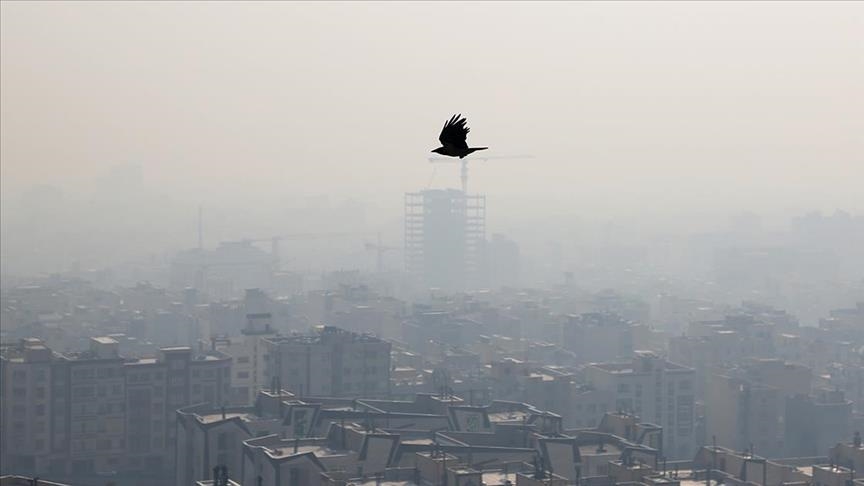Air in Tehran ‘unbreathable’ as pollution peaks
This year has seen air quality index touching dangerously high levels not only in Tehran but also other major cities

TEHRAN
For the past several weeks, the air in Tehran and some other major metropolises across Iran has become irrespirable, with the pollution index touching dangerously high levels.
The Air Quality Index (AQI), which measures levels of air contamination, has seen an alarming upturn in the capital in recent weeks, crossing the threshold of 200, deemed “heavily polluted.”
Tehran, a bustling financial hub surrounded by the majestic Alborz Mountains, presents an interesting predicament to urban planners, government agencies and environmentalists.
A thick layer of smog enveloping the city remains trapped for winter months due to the phenomenon called ‘temperature inversion,’ say experts. The long spell of dryness makes it only worse.
The World Health Organization (WHO) had in 2018 put Tehran in the category of ‘most polluted cities in the world,’ while the World Bank in its 2018 report said the city accounts for 4,000 of the 12,000 deaths due to air pollution in Iran annually.
This year has been worse, according to government officials and environmentalists, with the AQI touching a record high not only in Tehran but also in other major cities such as Tabriz, Isfahan and Mashhad.
There are no recent figures available to show the impact of polluted air, but experts say deaths due to diseases caused by air pollution are likely to be higher this year than previous years.
Amid the battle against the COVID-19 pandemic, rising pollution levels present a bigger challenge for government agencies and healthcare professionals with a surge in hospitalizations.
Dire situation
According to recent reports published by the Tehran Air Quality Control Company, the inhabitants of Tehran inhaled more contaminated air in the past few months than during the same period last year.
Throughout the month of December, the AQI remained in the ‘red zone’ (151-200), meaning “unhealthy.” On some days, the index even breached the 300 mark, deemed “hazardous.”
The main pollutants, environmental experts say, include mobile sources like vehicular traffic and stationary sources like oil refineries, power plants and manufacturing industries.
Iran’s Oil Minister Bijan Namdar Zanganeh recently created a tizzy by suggesting that a shortage of fuel had forced power plants to use refined diesel and mazut, a low-quality fuel oil.
“This is not an ideal option. The main fuel source for the plants is Euro-7 diesel, but to keep the plants running, mazut is being used,” he said, blaming people for high electricity and gas usage.
Massoud Farahmand, an environmental expert from Tehran, said the authorities need to “seriously implement measures” including restrictions on private vehicles and consumption of fuel oil.
“It is an emergency situation by all environmental standards,” he told Anadolu Agency. “It’s a problem that recurs every year, and this year, the situation has turned extremely worrying.”
A city with a population of about 9 million, Tehran becomes even busier and more crowded during the daytime, with people from nearby cities and counties flocking for work.
As noted in the 2018 World Bank study, rapid population growth due to constant migration, burgeoning industrialization and high traffic add to the pollution woes of Iran’s capital.
In a recent meeting convened by Tehran’s Deputy Governor Abdolreza Cheraghali, imposing stringent traffic rules and a partial lockdown were some of the options discussed as a solution to the problem.
However, official sources said the lack of coordination between different agencies of the government comes in the way of implementing policy decisions.
Last month, Iran’s Air Pollution Emergency Committee had proposed a complete two-day closure in Tehran, a move that was reportedly opposed by top government functionaries.
Enforcement of the 2017 Clean Air Law has also faced impediments due to a lack of coordination between implementing agencies like the Ministry of Health, Ministry of Petroleum, Ministry of Energy and Tehran Municipality, say observers.
“As per the law, present pollution indicators in the country fall in the category of an emergency situation which calls for an emergency response from all concerned agencies,” Mohammad Jafari, a researcher and activist with a focus on environmental issues, told Anadolu Agency.
The problem of pollution, besides its health costs, also hits the state exchequer. Hossein Shahidzadeh, the head of the Tehran Air Quality Company, referring to the 2018 World Bank report, last week said the problem of air pollution in Tehran incurs an annual loss of $2.6 billion, accounting for a $7 million loss daily.
Concerns and alarm
While alarm bells have been sounded by relevant authorities and environmentalists, there appears to be a mix of indecision and indifference from the government to implement legal measures.
Officials at Iran’s Health Ministry had recently issued a health advisory, urging high-risk groups with cardiovascular or respiratory conditions or the elderly and children to refrain from moving outdoors.
There have been reports of an increase in hospitalizations in recent days in Tehran, Qazvin, Isfahan and other cities, mainly with complaints related to respiratory and cardiac conditions.
While coronavirus cases in Iran have witnessed a substantial drop in recent weeks, officials have warned against complacency, especially with the UK variant of the virus already in the country.
On Wednesday, Ayatollah Jannati, who heads the top supervisory body the Guardian Council, termed the rise in the pollution level “a worrying situation,” urging action from relevant bodies.
Arash Hosseini, who heads the environmental committee at the Tehran City Council, has also called on lawmakers to devise a mechanism in identifying sources of pollution and defining penalties.
There are also growing calls about strict enforcement of the Clean Air Law to prevent consumption of fuel oil (mazut), which is seen as one of the main factors responsible for the pollution problem.








